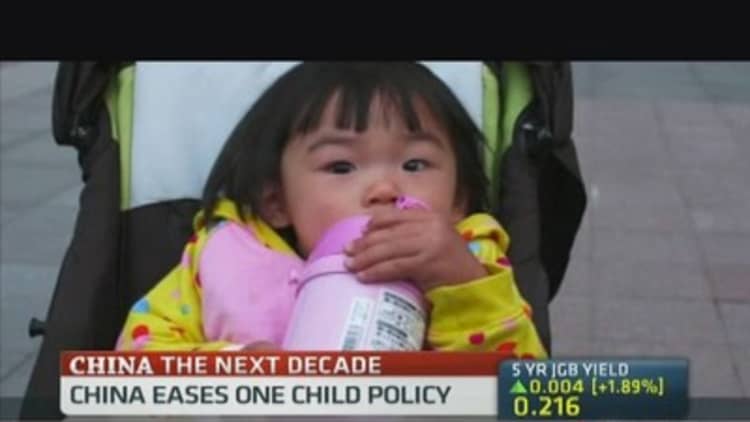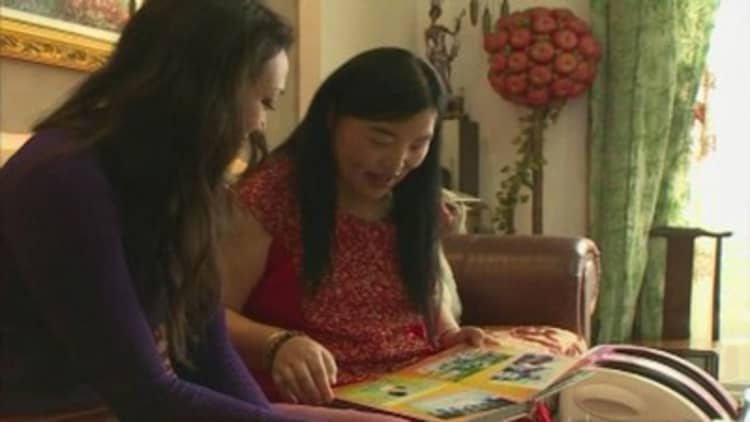
For twenty-six year old Wang JingJing, who is pregnant with her first baby, the landmark change to China's controversial one-child policy, means she is one step closer to realizing her dream of having a big family just like her grandparents did.
"I love this new change. I support it 100 percent and I know that in the future, China will eventually be like what it was like in our grandparents' days," she told CNBC.
(Read More: China's economic reforms: What you need to know)
Chinese policy makers unveiled a raft of sweeping reforms on Friday, including a widely-anticipated change to the country's one-child policy, a policy which has attracted criticism worldwide since its implementation in the late 1970s.
The controversial policy was successful in nearly halving the fertility rate over the past three decades, at a time when China's rising population was a deemed a problem, but has brought with it a slew of negative side-effects, including a rise in sex-selective abortions and infanticide. Meanwhile, from an economic standpoint, it has led to concerns over a rapidly aging population and a decline in the working age population.
(Read More: China to relax one-child policy as part of reforms: Reports)
Now, Chinese families will soon be able to have a second child if one of the parents has no brothers and sisters, a marked change from the previous law where both parents needed to be only children to allow a second child to be born.
But some fear the rule-change, which policy-makers hope will give the economy a boost, might not be as effective as hoped.
"China, like the rest of the world, is under strain from an aging population and this policy is designed to 'slow the speed at which the country's population is aging and boost [the] labor [force],'" said Evan Lucas, market strategist at IG.
"This is a very long-term policy as only-child parents are not as common as most people would believe, so this will take almost two decades to be felt," he added.
And even for families who will be positively affected by the rule change in the short-term, the opportunity to have a second child might not appeal.
CNBC spoke to Wang Hengjin, who has one child with his wife, about how Friday's rule change will impact him.
"Having two children costs too much, it also takes a lot of energy. If we were to have another child, time or money-wise – it would be a heavy burden for us," he said.
26-year old Beijing-based Wang also highlighted that many people of her generation might not jump the chance to have a second child, adding that the one-child policy resulted in selfish and spoiled mentality in her generation.
"Realistically, what holds some people back is the fact that raising a child is too expensive," she said.
(Read More: How China's one-child policy hurts the elderly)
But Wang told CNBC that cost would not deter her from having another child.
"I don't share the same view since I would love to have two or even three kids," she said.
"I know that people say it is so expensive, [with] education costs, and that raising one child will cost you around 1 million renminbi. But I think that as long as you provide your child with the basics and real love and care then nothing is that big of a deal," she added.

She added, however, that she wasn't expecting any overnight changes following Friday's announcement.
"The reforms and changes will take time and as China is connecting more with other countries, China will no doubt change her policies and reforms...China also needs to change her healthcare system and resource allocations," she said.
(Read More: Economics behind China relaxing its one-child policy)
No specific date has been set as to when the new policy will start, the plenary statement instead said that it would "gradually adjust and improve family planning, promoting the development of balanced population."
Other important reforms unveiled on Friday include changes to the land registration system, opening up of state owned enterprises (SOEs) and further freeing up of financial markets.
(Read More: Could China make or break bitcoin?)
— By CNBC's Katie Holliday: Follow her on Twitter @hollidaykatie

